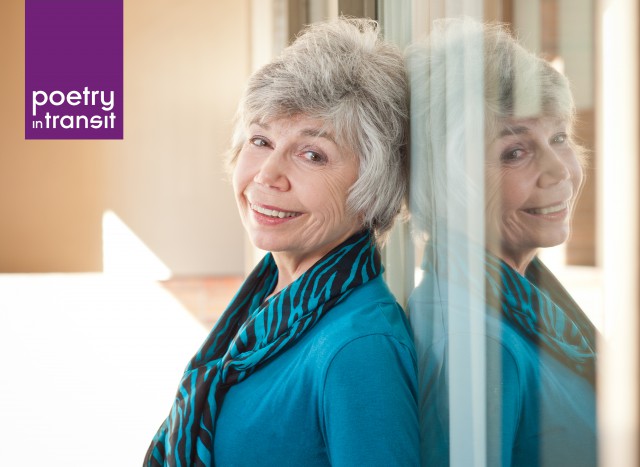Poetry in Transit interview with Jane Munro
Poetry in Transit interview with Jane Munro

Poetry in Transit, now in its 18th year, aims to profile talented British Columbian and Canadian poets and provide our customers with poetry to read on their commutes. This year, there are a total of 20 poems on the system – 10 poetry car cards on buses and 10 transit shelter ads.
One of them is “Old Man Vacanas, 11” by Jane Munro. I had the opportunity to chat with Jane about the poem and her work:
Who is Jane Munro?
I’m a Vancouver-based writer and poet.
Would you be able to tell us a bit more about “Old Man Vacanas, 11?” What were the inspirations behind it?
My husband had Alzheimer’s disease. We lived in an isolated area on the “wild coast” of Vancouver Island. I was his caregiver until he had to move into a nursing home. He died in 2013. This is the final poem in a sequence called “Old Man Vacanas.” You can find the whole set in my new book, Blue Sonoma.
How would you classify your style of poetry and writing? What inspires you?
In form, this poem is inspired by vacanas, ancient South Indian prayer-poems. Vacana means “saying” or “thing said” in Kannada, the language in which the 12th Century poems were written. They use colloquial diction and imagery drawn from village life to deal with philosophical questions. Unlike those original vacanas, my poem is not addressed to Siva.
What’s a ‘great’ poem for you?
One that moves me and sticks in my mind – a poem I’ll read again. Jane Hirshfield says, “A good poem is a bit like a volcanic island. It creates new terrain for the soul.” In a volcano, the stuff coming up was previously hidden. Poems can make visible—and invite us to pay attention to—individual and social shadows. If Jung’s right and we need to agree to the whole experience to get a full life, then incorporating what was molten and unformed into a concentrated pattern of words gives us new ground—a place to explore, camp out, maybe even plant a garden. Oddly, though it may at first strike us as “new terrain,” we recognize and trust its reliability and its continuity with the rest of our experience: now that it’s there, it’s there.
Who’s your favourite poet and/or somebody that has heavily influenced your work?
I’ve loved poetry since my mother sang nursery rhymes to me. A wide variety of poetry delights me and enriches my life. I can’t begin to list my favourite poets. Many poems have influenced my work. Even nursery rhymes!
What does Poetry of Transit mean for you?
I love having a poem riding around on transit, catching the eyes of passengers. It’s a wonderful outing for a poem. Too many poems stay closeted in slender volumes. It’s great to have one out and about. I hope lots of people read it.
Do you take transit? If so, what’s your favourite mode?
Yes, I take transit. I often ride the 99 bus to UBC and back. It’s wonderfully convenient to take SkyTrain to and from the airport. Crossing the harbour on SeaBus feels like an adventure.
Peer into your crystal ball, and tell us what you see for yourself in the future.
More writing – more books – more poetry readings – more yoga, and more travel. My next big trip will be to study yoga in India.
Is there anything you’d like to add or share?
I’m a member of Yoko’s Dogs. We write collaborative poetry.
Thanks your time Jane! “Old Man Vacanas, 11” is from her book, Blue Sonoma, and you can visit her website at janemunro.com. Join the conversation using the hashtag #PoetryInTransit!
Author: Allen Tung





